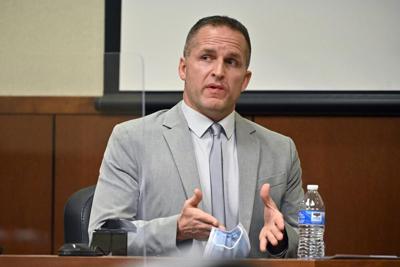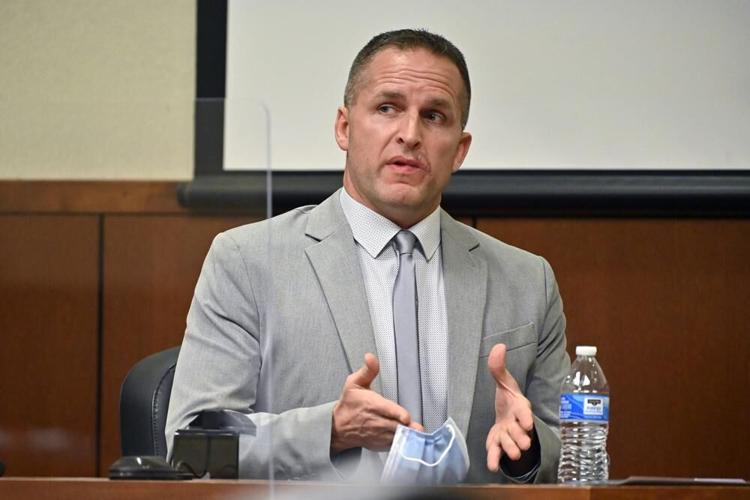LOUISIVLLE, Ky. (WDRB) – A federal jury on Friday found former Louisville officer Brett Hankison guilty of using excessive force and violating the civil rights of Breonna Taylor in a botched police raid of her home in 2020.
The jury — made up of six women and six men, one of whom is Black — found Hankison not guilty of violating the civil rights of Taylor's neighbors.
Prosecutors asked that Hankison be immediately taken into custody, but U.S. District Court Judge Rebecca Grady Jennings decided to leave him out on bond until he is sentenced.
The judge, not the jury, will decide the sentence on March 12. He is facing a maximum of life in prison.
Hankison was the only officer charged for his actions during the raid. Three other officers were charged with their role in the search warrant affidavit, which included false information. No trial date has been set.
Hankison showed little reaction upon hearing the guilty verdict, although some media have reported he appeared to wipe away a tear. At least four jurors looked like they were in tears.
Taylor's family embraced in the courtroom and spoke to reporters after the verdict, expressing relief, gratitude and a reminder that other officers are still facing charges over the raid.
"Until you know what it feels like to watch your child be killed for 1,694 days and nobody hold anybody accountable, I don't think anybody could understand what that feels like unless you're knee deep in it," Breonna Taylor's mother, Tamika Palmer, said.
Here's how we got here.
The trial centered around Hankison firing 10 times from outside Taylor's apartment through a covered sliding glass door and blinded windows in Taylor's bedroom window, with three bullets flying into an adjacent apartment where Cody Etherton, Chelsey Napper and her 5-year-old child lived.
Hankison also nearly hit Taylor and a fellow police officer.
U.S. Attorney General Merrick Garland said in a statement that the "verdict is an important step toward accountability for the violation of Breonna Taylor’s civil rights, but justice for the loss of Ms. Taylor is a task that exceeds human capacity.”
Former Louisville Mayor Greg Fischer said in a statement that the verdict can never "erase the pain of Breonna’s family, friends and loved ones. I know the time this has taken was difficult for our entire city, but it was critical for the justice system to do its work and find accountability.
"While there are still upcoming cases related to the search warrants, it is my hope that this step, related police reform and continued community involvement will in some measure help restore faith in our institutions and belief in our justice system."
Mayor Craig Greenberg tweeted that he was hopeful this would some measure of peace to Breonna Taylor's family and the community.
"We still have work ahead, but progress is being made every day to improve public trust and unite our city," he wrote.
Late Friday night, jurors found Hankison not guilty on one charge involving Taylor's neighbors, but were still deadlocked on the other count involving Taylor.
The defense requested the judge have them return to deliberate on Saturday.
Jennings responded, "I'm not even sure I'm allowed to do that."
Prosecutors said they also hadn't heard of a federal jury deliberating over the weekend. It has happened in Louisville, but it is rare.
The judge instead gave jurors another Allen charge and sent them back to continue deliberating.
The decision to convict Hankison on the charge involving Breonna came about two hours later.
"We're here, we did it," Palmer said.
Taylor’s family said they are “grateful” for the verdict and decision by prosecutors to retry the case. pic.twitter.com/HUkIaunmPa
— Jason Riley (@JasonRileyWDRB) November 2, 2024
After the verdict, Judge Jennings told jurors they are not allowed to talk about the trial and to notify the judge if anyone attempts to ever discuss it with them. She said it was a "local" rule.
Last year, during Hankison's first federal trial, jurors deadlocked and Jennings ordered a mistrial when jurors sent out a note that some of them had "concluded deliberating" and could not come to a unanimous ruling.
The charges stem from a March 13, 2020, raid of Taylor's home in the middle of the night, in which police officers busted down her door to serve a search warrant related to a drug dealer who lived 10 miles away.
Police sought out a search warrant for Taylor's home as part of a broader investigation that focused on drug suspect Jamarcus Glover. Police believed Glover may have been using Taylor's apartment to receive drugs and store money.
When police burst in, Taylor's boyfriend, Kenneth Walker, fired a shot that hit Sgt. John Mattingly in the leg. Walker has said he believed the couple were being robbed.
Multiple Louisville Metro Police officers returned fire, killing 26-year-old Taylor. No drugs were found in her home.
Her death, along with George Floyd's, resulted in months of protests in Louisville and across the country over police brutality and racial discrimination.
This was Hankison's third trial in total related to his actions the night of the raid. The federal jury last year deadlocked in November on the two counts of civil rights violations.
A state Jefferson Circuit Court jury in March 2022 found Hankison not guilty on three counts of wanton endangerment.
Prosecutors this week told the jury Hankison's reckless actions on the night of the Taylor raid "shocked" other officers, traumatized neighbors and put multiple lives at risk.
Hankison fired 10 shots into a home he couldn’t see into, with bullets ripping through the wall into a neighboring apartment where a family and a child were sleeping, said prosecutor Michael Songer, with the U.S. Department of Justice.
The defense argued that Taylor may have already been dead when Hankison started firing, and thus her civil rights could not be violated.
He is facing a possible life sentence.
This argument seemed to be a sticking point with jurors.
A little after 10:30 a.m. Thursday the jury sent out a note asking the judge whether they "needed to know" whether Breonna Taylor was a "living victim" when Hankison was shooting.
The prosecution argued that Taylor only had to be alive when Hankison fired his first shot that went over her head, which was just a few seconds after the shooting began.
Prosecutors told jurors Hankison's actions threatened the lives of both officers and citizens.
"Even when officers face the most serious threats, they can’t fire their weapon unless they know what they are shooting at," Songer told the jury. "It’s just common sense. They can never just guess where a suspect might be."
But Defense attorney Donald Malarcik called the incident "12 seconds of chaos," pointing out that 32 shots were fired in the time officers burst through the door and Taylor was shot in an "unfathomable tragedy."
Hankison had never been in a situation like what happened that night, where he had to make a "split-second" decision and believed Walker had an assault rifle, Malarcik said.
"It sounded to him like Kenneth Walker is walking down that hall, executing his fellow officers," Malarcik said. "He did exactly what he was supposed to do. He was acting to save lives."
Hankison testified earlier this week that he had no doubt officers were in danger as he had already seen Mattingly shot when police burst through Taylor's door to serve a warrant and he saw a "large muzzle flash" he believed was coming from an assault rifle.
In actuality, Walker fired one shot from a handgun and did not advance on officers.
Hankison testified he saw lights and believed he knew where the shooter was by the sound of the shots and where he was when police first entered the apartment.
"Even if you believe that is true, that is not a defense in this case," Songer told jurors Wednesday. "He just saw two windows on the side of an apartment building with light in them. He just guessed."
The defense pointed out that none of Hankison’s shots hit anyone, despite all of the theoretical scenarios prosecutors said could have happened.
"Seven police officers volunteered to do their job and they showed up and Kenneth Walker, hiding in the darkness, shot John Mattingly," Malarcik said. "That’s not a hypothetical. That really happened."
Mattingly and Myles Cosgrove returned fire, hitting and killing Taylor. They were not charged in the shooting. Mattingly retired and Cosgrove was fired for failing to properly "identify a target," violating the department’s use of force policy and failing to use a body camera.
Investigators said Cosgrove fired the fatal shot, killing Taylor.
The city of Louisville paid $12 million to Taylor's family and implemented numerous reforms in the police department to settle a wrongful death lawsuit.
The trial moved quickly.
And the Department of Justice began a wide-ranging civil rights review in Louisville in the wake of Taylor's death.
Federal investigators strongly rebuked the actions of Louisville police, saying they believe the department and Metro Government for years engaged in practices that violated the U.S. Constitution and federal law, including excessive use of force and searches based on invalid search warrants.
"It took a lot of patience, it took a lot of time, 1,694 days it took," Palmer said. "It was long, it was hard. Thank god... I'm grateful to everyone involved. We're here."
LMPD released the following statement Saturday on social media:
LMPD respects the jury’s verdict. It is not lost on us that this event forever altered the fabric of our community, and we acknowledge the pain caused by the death of Breonna Taylor. Our officers are sworn to protect and serve the community, upholding the law with integrity......
— LMPD (@LMPD) November 2, 2024
Previous Coverage:
- Judge in Breonna Taylor case won't let jurors hear of Brett Hankison's prior 'aggressive' acts
- Woman shot in face with rubber bullet by LMPD during Breonna Taylor protest paid $150,000
- Two former Louisville police officers involved in Breonna Taylor raid have been indicted again
- DOJ appeals dismissal of most serious charges against 2 officers involved in Breonna Taylor raid
- Federal judge dismisses most serious charges against 2 officers involved in Breonna Taylor raid
- TRANSCRIPT | US Attorney General announces federal charges in death of Breonna Taylor
Copyright 2024 WDRB Media. All Rights Reserved.




